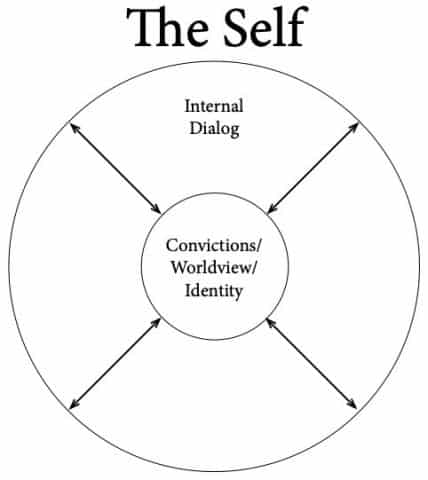Identity and the Self
 Somewhere in the early stages of life, we begin to become aware of ourselves as distinct. This awareness fosters self-reflection; the ability to think about ourselves in the third person. Self-reflection is an important and healthy skill for all people. It gives us the capacity to carry on conversations with ourselves and actually form an attachment to ourselves much like we would another person. We can even like or dislike ourselves.
Somewhere in the early stages of life, we begin to become aware of ourselves as distinct. This awareness fosters self-reflection; the ability to think about ourselves in the third person. Self-reflection is an important and healthy skill for all people. It gives us the capacity to carry on conversations with ourselves and actually form an attachment to ourselves much like we would another person. We can even like or dislike ourselves.
The Developing Self
As Christian parents and educators, our desire to influence identity development must, therefore, recognize the value and role of the “self” as an essential developmental factor. Babies are more than “sponges” soaking up the data coming at them through their senses. They are processing that data and determining whether it is significant and meaningful. They are interacting with the data and, sooner or later, with themselves as they process the data. The self is “talking” to itself and, sooner or later, talking back. Questions are raised. Arguments are made. Agreements are reached, even at a young age.
This internal dialog of the self is relevant because it impacts identity development as much as anything else, perhaps more. It is this internal dialog that serves as the final “gatekeeper” to identity. It is self that ultimately allows various pieces of data (and the claims they make) to access our inner convictions and become part of what we believe about ourselves and others (our worldview). The following graphic illustrates this internal dialog and the dynamic at play to influence a child’s worldview.

The Self is Dynamic
If you start in the center of the graphic, you’ll see that the child’s worldview, limited though it may be, is where convictions are stored and where the child holds its perceived and developing identity. Around that is the “internal dialog” where The Self is weighing and “discussing” the validity of the data (in a very rudimentary way) that’s coming in through the senses. What gets committed to memory and conviction at one point becomes a means by which new data and new ideas are evaluated and allowed “in” or not. These things (the child’s worldview, identity, and internal dialog) are all part of the dynamic Self at the center of the child’s life.
Part of what the caring parent or committed church leader must do is seek to influence the internal dialog in a way that allows the truth of Scripture to gain a foothold in the child’s worldview. This is done by helping the child form meaningful attachments that facilitate biblical learning. We’ll talk about attachments in the next article.
This article is one of a series related to identity.
Find Helping People Develop a Biblical Identity here.
Find We Are More Than We Think here.
Find Shaping Identity in the Local Church here.
Find Identity and the God of the Bible here.
Find Identity, Relationships, and Distinction here.
Rick Edwards
Author, Speaker, Bible Teacher
See a list of other articles by Rick Edwards.



